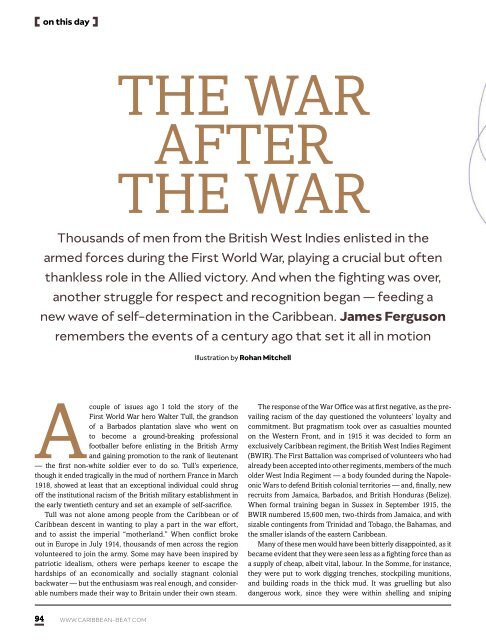Caribbean Beat — November/December 2018 (#154)
A calendar of events; music, film, and book reviews; travel features; people profiles, and much more.
A calendar of events; music, film, and book reviews; travel features; people profiles, and much more.
Create successful ePaper yourself
Turn your PDF publications into a flip-book with our unique Google optimized e-Paper software.
on this day<br />
The war<br />
after<br />
the war<br />
Thousands of men from the British West Indies enlisted in the<br />
armed forces during the First World War, playing a crucial but often<br />
thankless role in the Allied victory. And when the fighting was over,<br />
another struggle for respect and recognition began <strong>—</strong> feeding a<br />
new wave of self-determination in the <strong>Caribbean</strong>. James Ferguson<br />
remembers the events of a century ago that set it all in motion<br />
Illustration by Rohan Mitchell<br />
A<br />
couple of issues ago I told the story of the<br />
First World War hero Walter Tull, the grandson<br />
of a Barbados plantation slave who went on<br />
to become a ground-breaking professional<br />
footballer before enlisting in the British Army<br />
and gaining promotion to the rank of lieutenant<br />
<strong>—</strong> the first non-white soldier ever to do so. Tull’s experience,<br />
though it ended tragically in the mud of northern France in March<br />
1918, showed at least that an exceptional individual could shrug<br />
off the institutional racism of the British military establishment in<br />
the early twentieth century and set an example of self-sacrifice.<br />
Tull was not alone among people from the <strong>Caribbean</strong> or of<br />
<strong>Caribbean</strong> descent in wanting to play a part in the war effort,<br />
and to assist the imperial “motherland.” When conflict broke<br />
out in Europe in July 1914, thousands of men across the region<br />
volunteered to join the army. Some may have been inspired by<br />
patriotic idealism, others were perhaps keener to escape the<br />
hardships of an economically and socially stagnant colonial<br />
backwater <strong>—</strong> but the enthusiasm was real enough, and considerable<br />
numbers made their way to Britain under their own steam.<br />
The response of the War Office was at first negative, as the prevailing<br />
racism of the day questioned the volunteers’ loyalty and<br />
commitment. But pragmatism took over as casualties mounted<br />
on the Western Front, and in 1915 it was decided to form an<br />
exclusively <strong>Caribbean</strong> regiment, the British West Indies Regiment<br />
(BWIR). The First Battalion was comprised of volunteers who had<br />
already been accepted into other regiments, members of the much<br />
older West India Regiment <strong>—</strong> a body founded during the Napoleonic<br />
Wars to defend British colonial territories <strong>—</strong> and, finally, new<br />
recruits from Jamaica, Barbados, and British Honduras (Belize).<br />
When formal training began in Sussex in September 1915, the<br />
BWIR numbered 15,600 men, two-thirds from Jamaica, and with<br />
sizable contingents from Trinidad and Tobago, the Bahamas, and<br />
the smaller islands of the eastern <strong>Caribbean</strong>.<br />
Many of these men would have been bitterly disappointed, as it<br />
became evident that they were seen less as a fighting force than as<br />
a supply of cheap, albeit vital, labour. In the Somme, for instance,<br />
they were put to work digging trenches, stockpiling munitions,<br />
and building roads in the thick mud. It was gruelling but also<br />
dangerous work, since they were within shelling and sniping<br />
94 WWW.CARIBBEAN-BEAT.COM


















